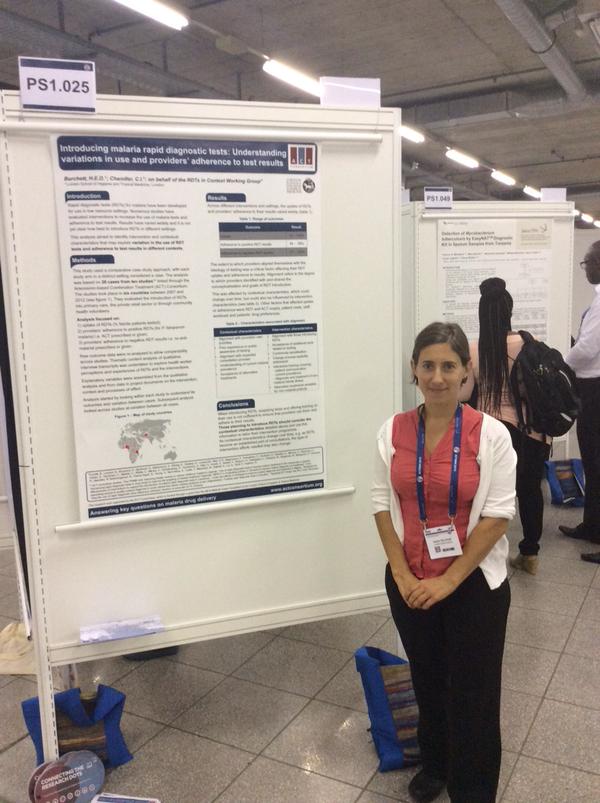Diagnostics in malaria treatment and control: Day 1 at ECTMIH 2015
8 September 2015

On the first day of the European Congress on Tropical Medicine and International Health, ACT Consortium investigators presented findings from research studies on malaria diagnostics.
Professor Marcel Tanner, director emeritus of the conference-host Swiss Tropical and Public Health Institute, and Chair of the ACT Consortium Expert Oversight Committee, introduced the inaugural plenary speakers on Sunday evening in Basel, Switzerland.
Dr. Matshidiso Moeti, WHO Regional Director for Africa, highlighted the need to translate knowledge into practice and affordable use on the ground, which requires the involvement of research and policy makers. As the world shifts from the UN Millenium Development Goals into the Sustainable Development Goals, investments in health are still inadequate, health systems are weak, and social determinants of health are not addressed.
Professor Peter Piot, Director of the London School of Hygiene & Tropical Medicine, emphasized the need to adapt responses to new global health needs: centres of excellence should replace individual study sites, research should expand from biomedical to multidisciplinary approaches, and non-communicable diseases will deserve increasing attention in low and middle income countries.
Importance of diagnostics in malaria treatment and control
On the first full day of scientific sessions, Professor David Schellenberg presented an overview of ACT Consortium research on malaria diagnosis.
Impact of malaria rapid diagnostic tests on patient care
Malaria rapid diagnsotic tests (RDTs) were intended to be beneficial for patients. Many ACT Consortium studies were designed to test operational strategies to implement the use of both RDTs and artemisinin-based combination therapies (or ACTs, the most effective treatment for malaria).
Dr Katia Bruxvoort presented on behalf of several investigators who are analysing data from eight studies in four countries. They compared different scenarios in order to examine the impact that the availability of RDTs has on clinical and patient care, including what health workers prescribe and whether they refer patients for further treatment.
With the goal to inform malaria control programmes on how to implement RDTs in different areas, this research intends to answer the following questions:
- Have RDTs achieved their goals of improving access to diagnostic and ACT targeting?
- What are the other effects of RDT introduction on patient care?
Preliminary analysis shows that introducing RDTs improves targeting of ACT medicines. Generally, the use of these tests leads to a decrease in overprescription of ACTs to people who do not need them. Also, introducing RDTs may be associated with an increase in untargeted use of antibiotics.
Full results on the proportion of patients who were tested for malaria and who received an ACT, an antibiotic or another medicine, will be available later in 2015.
Using malaria rapid diagnostic tests in registered drug shops in Uganda
The use of RDTs in the private retail sector reduced the overprescription of ACT medicines by over 70%, improving the targeted use of these valuable malaria drugs, according to recent research published in PLOS ONE.
Dr Sian Clarke from the London School of Hygiene & Tropical Medicine, who led the study together with Dr Anthony Mbonye at the Ministry of Health in Uganda, presented the findings on behalf of the research team:
Key learning for programme implementers include:
- It is feasible to collaborate with the private retail sector to improve malaria treatment
- Visible government involvement may help promote compliance with guidelines
- RDT use may give a false impression of vendors’ other skills, and could expose patients to less desirable practices
- RDTs should only be introduced within broader accreditation programmes aiming to improve standard of care in private retail sector. Effective regulation by authorities is also needed.
For further information including a project video, training manuals and job aids, as well as an evidence brief, visit www.actconsortium.org/RDTdrugshops.
We invite you to use this 90 second animation to contextualise your own research and knowledge on malaria diagnosis:
ACT Now For a Malaria Free World from ACT Consortium on Vimeo.
Posters and speed presentations
- Diagnosing latent tuberculosis with interferon-gamma release assays in patients with concurrent malaria infection in Tanzania (Dr Lasse Vestergaard, University of Copenhagen)
 Mapping fever aetiologies in malaria-endemic areas: an interactive, open-access, on-line map (Dr Heidi Hopkins, London School of Hygiene & Tropical Medicine)
Mapping fever aetiologies in malaria-endemic areas: an interactive, open-access, on-line map (Dr Heidi Hopkins, London School of Hygiene & Tropical Medicine)- Disseminating research findings to inform malaria policy: examples from the ACT Consortium (Débora Miranda, London School of Hygiene & Tropical Medicine)
- Explaining wide variation in malaria rapid diagnostic test uptake and adherence to test results (Helen Burchett, London School of Hygiene & Tropical Medicine - photo)
Further information
- ECTMIH 2015: ACT Consortium joins major congress in Switzerland
- ECTMIH Day 2: Rapid diagnostic tests and research consortia
- ECTMIH Day 3: Substandard and falsified medicines
- Follow us on Twitter at #ECTMIH2015 and @ACTConsortium
- Share your ideas, questions and answers on our LinkedIn group
Photo: David Schellenberg at ECTMIH2015. (Bianca D'Souza)

